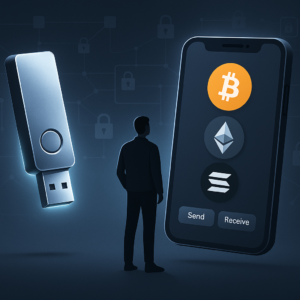
What Is a Crypto Wallet and Which One Should I Use? If you’re just starting out in the world of cryptocurrency, one of the first things you’ll need to understand is the concept of a crypto wallet. A wallet is your gateway to storing, accessing, and controlling your digital assets. But with so many options available, how do you know which one is right for you?
In this article, we’ll explain what a crypto wallet actually is, the difference between hot and cold wallets, and how to pick the best wallet depending on how you plan to use crypto—whether that’s investing, trading, or long-term holding.
What Is a Crypto Wallet?
A crypto wallet is a digital tool that stores your private keys—secure codes that give you access to your cryptocurrencies. Contrary to the name, it doesn’t store coins like a leather wallet would store cash. Instead, it provides the interface for interacting with the blockchain.
Your wallet allows you to send and receive cryptocurrencies like Bitcoin and Ethereum, check your balances, and manage your portfolio. Without a wallet, you can’t access your coins—even though they’re technically stored on the blockchain.
Hot Wallets vs Cold Wallets
Crypto wallets generally fall into two categories: hot wallets and cold wallets. Understanding the difference is crucial for security and usability.
Hot Wallets
Hot wallets are connected to the internet. They’re software-based and come in the form of mobile apps, desktop applications, or browser extensions. These wallets are ideal for beginners and casual traders.
Popular hot wallets include:
- Trust Wallet – A user-friendly mobile wallet supporting multiple blockchains.
- MetaMask – A browser-based wallet ideal for interacting with Ethereum-based apps.
- Coinbase Wallet – Tied to the Coinbase ecosystem with DeFi access.
Pros:
- Free and easy to set up
- Great for daily use and small transactions
- Integrated with decentralized applications (dApps)
Cons:
- Vulnerable to hacking, malware, and phishing
- Security depends on your device and internet connection
Cold Wallets
Cold wallets are offline devices that store your private keys without ever connecting to the internet. These are ideal for long-term holders or investors with larger amounts of cryptocurrency.
Popular cold wallets include:
- Ledger Nano S/X – Trusted hardware wallets supporting dozens of cryptocurrencies.
- Trezor Model One/Model T – Open-source hardware wallets known for their reliability and user interface.
- Paper Wallets – Physical printouts of your private and public keys (now less commonly used due to security concerns).
Pros:
- Extremely secure—immune to most online threats
- Ideal for long-term storage
- Often support staking and offline signing
Cons:
- Cost between $50–$200
- Less convenient for active traders
- Requires secure storage of physical device
How Do Crypto Wallets Work?
Each wallet generates a public key and a private key. The public key acts like your crypto “address”—you can share it to receive funds. The private key is your access code, and it must be kept secret.
Wallets also generate a 12- or 24-word recovery phrase, also called a seed phrase. This phrase can be used to restore your wallet if you lose access to your device. If someone else gets your seed phrase, they can take all your crypto. If you lose it and your device dies, your funds are gone for good.
Which Wallet Should You Use?
The best wallet for you depends on your crypto goals. Here’s a quick breakdown:
- New users or casual buyers: Use a hot wallet like Coinbase Wallet or Trust Wallet. They’re free and easy to use.
- DeFi and NFT users: MetaMask is ideal for interacting with Ethereum apps and decentralized finance.
- Long-term investors: Get a hardware wallet like Ledger or Trezor for peace of mind and cold storage security.
- Traders: Keep small amounts in a hot wallet and move profits to cold storage regularly.
Pro tip: Consider using both. Many people use a hot wallet for everyday use and a cold wallet for long-term holding.
Security Tips for Any Wallet
- Write down your seed phrase and store it in a secure location offline.
- Enable 2FA on any exchange or wallet that supports it.
- Be cautious of fake wallet apps—always download from official websites or app stores.
- Never share your private key or seed phrase with anyone—ever.
Conclusion
Crypto wallets are an essential part of using, holding, and investing in digital currencies. Whether you go with a mobile app, a hardware device, or both, your choice of wallet impacts your security and your experience in the crypto space.
Ready to explore our top wallet recommendations and learn how to set one up? Head over to Krypto101.com for our complete wallet comparison guide and beginner-friendly tutorials.
